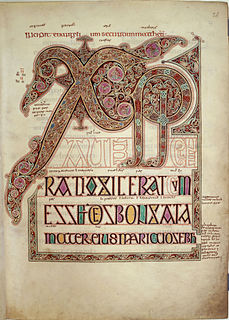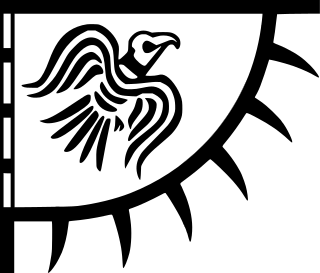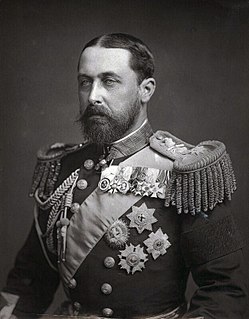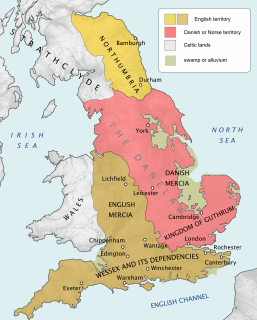
Alfred the Great was king of the West Saxons from 871 to c. 886 and king of the Anglo-Saxons from c. 886 to 899. He was the youngest son of King Æthelwulf of Wessex. His father died when he was young. Three of Alfred's brothers, Æthelbald, Æthelberht and Æthelred, reigned in turn before him.

Wessex was an Anglo-Saxon kingdom in the south of Great Britain, from 519 until England was unified by Æthelstan in 927.

The Anglo-Saxons were a cultural group who inhabited England. They traced their origins to the 5th century settlement of incomers to Britain, who migrated to the island from the North Sea coastlands of continental Europe. However, the ethnogenesis of the Anglo-Saxons occurred within Britain, and the identity was not merely directly imported. The development of an Anglo-Saxon identity arose from the interaction between incoming groups of people from a number of Germanic tribes, both amongst themselves, and with indigenous British groups. Many of the natives, over time, adopted Anglo-Saxon culture and language and were assimilated. The Anglo-Saxons established the Kingdom of England, and the modern English language owes almost half of its words – including the most common words of everyday speech – to their language.

The King's School is a 13–18 mixed, independent, boarding and day school in Canterbury, Kent, England. It is a member of the Headmasters' and Headmistresses' Conference and the Eton Group. It is Britain's oldest public school; and is arguably the oldest continuously operating school in the world, since education on the Abbey and Cathedral grounds has been uninterrupted since AD 597.

The Danelaw was the part of England in which the laws of the Danes held sway and dominated those of the Anglo-Saxons. Danelaw contrasts with West Saxon law and Mercian law. The term is first recorded in the early 11th century as Dena lage. Modern historians have extended the term to a geographical designation. The areas that constituted the Danelaw lie in northern and eastern England, long occupied by Danes and other Norsemen.

Alfred reigned as Duke of Saxe-Coburg and Gotha from 1893 to 1900. He was the second son and fourth child of Queen Victoria of the United Kingdom and Albert, Prince Consort. He was known as the Duke of Edinburgh from 1866 until he succeeded his paternal uncle Ernest II as the reigning Duke of Saxe-Coburg and Gotha in the German Empire.

At the Battle of Edington, an army of the Anglo-Saxon kingdom of Wessex under Alfred the Great defeated the Great Heathen Army led by the Dane Guthrum on a date between 6 and 12 May 878, resulting in the Treaty of Wedmore later the same year. Primary sources locate the battle at "Eðandun". Until a scholarly consensus linked the battle site with the present-day town of Edington in Wiltshire, it was known as the Battle of Ethandun. This name continues to be used.
The name Edburga may refer to:

Bad Hair Day is the ninth studio album by "Weird Al" Yankovic, released on March 12, 1996. It was also Yankovic's last studio album for the Scotti Brothers label before it was purchased by Volcano Records in 1999. The album produced an array of hit comedy singles; lead single "Amish Paradise", which lampoons both Coolio's "Gangsta's Paradise" and the Amish lifestyle, charted at No. 53 on the Billboard Hot 100, while "Gump", which parodies "Lump" by the Presidents of the United States of America and the movie Forrest Gump, reached at No. 102.

Æthelwold or Æthelwald was the younger of two known sons of Æthelred I, King of Wessex from 865 to 871. Æthelwold and his brother Æthelhelm were still infants when their father the king died while fighting a Danish Viking invasion. The throne passed to the king's younger brother Alfred the Great, who carried on the war against the Vikings and won a crucial victory at the Battle of Edington in 878.

Alfred J. Kwak is a Dutch-German-Spanish-Japanese animated comedy-drama television series based on a Dutch theatre show by Herman van Veen, produced by Telecable Benelux B.V. in co-production with VARA, ZDF, Televisión Española and TV Tokyo and first shown in 1989. It consists of 52 episodes. The series characters were designed by Harald Siepermann. There are also toys and a comic based on the animated series.
The Aesti were an ancient people first described by the Roman historian Tacitus in his treatise Germania. According to Tacitus, the territory of Aesti was located somewhere east of the Suiones (Swedes).

Alfred Lewis Enoch is an English-Brazilian actor, best known for playing Dean Thomas in the Harry Potter film series and Wes Gibbins on the ABC legal drama television series How to Get Away with Murder.

The Doom Book, Dōmbōc, Code of Alfred or Legal Code of Ælfred the Great was the code of laws compiled by Alfred the Great. Alfred codified three prior Saxon codes – those of Æthelberht of Kent, Ine of Wessex and Offa of Mercia – to which he prefixed the Ten Commandments of Moses and incorporated rules of life from the Mosaic Code and the Christian code of ethics.

Alfred Aetheling, also Ælfred Æþeling (c. 1005–1036), was one of the eight sons of the English king Æthelred the Unready. He and his brother Edward the Confessor were sons of Æthelred's second wife Emma of Normandy. King Canute became their stepfather when he married Emma. Alfred and his brother were caught up in the power struggles at the start and end of Canute's reign.
The King Alfred Leisure Centre, owned by Brighton and Hove City Council and operated by Freedom Leisure, is the largest wet and dry sport centre in the city of Brighton and Hove and is situated on Hove sea front.
Elfreda, Elfrida, Alfrida, Elfrieda, Elfriede, Elftrude, Elftraut is a female given name, derived from Ælfþryð (Aelfthryth) meaning "elf-strength". The name fell out of fashion in the Middle Ages and was revived in the 19th century in both England and Germany. Although some of its modern forms like Alfieda can be mistaken for feminine versions of Alfred, that derives from Ælfræd. The Southern German diminutive Friedel or Friedl is nowadays more common than the full name.
Lota is a Portuguese feminine given name that is a diminutive form of Carlota, a nickname and surname. Notable people referred to by this name include the following:












